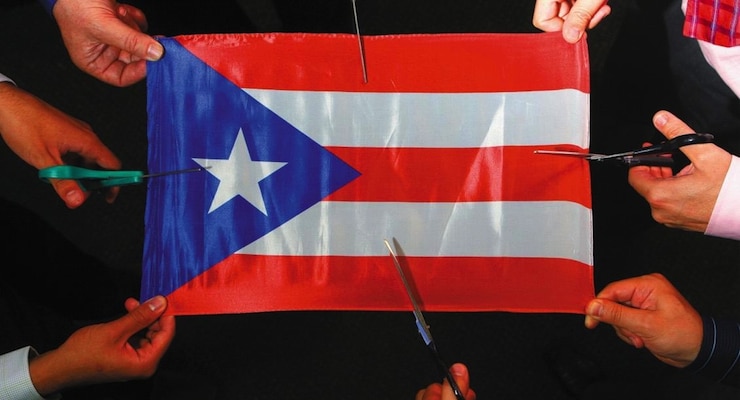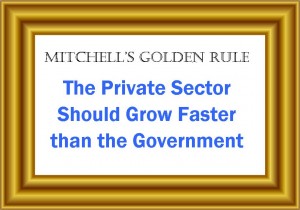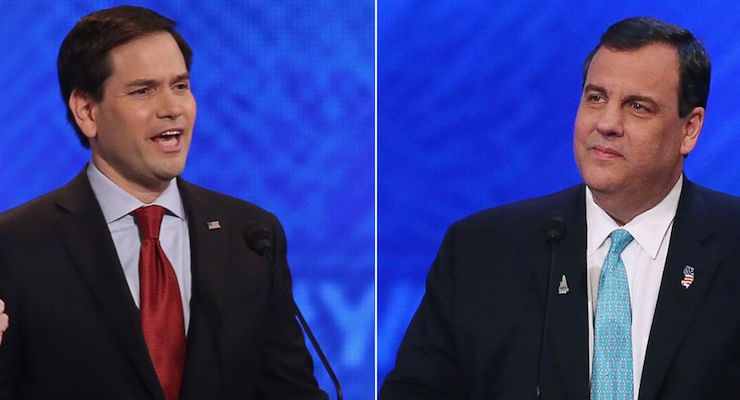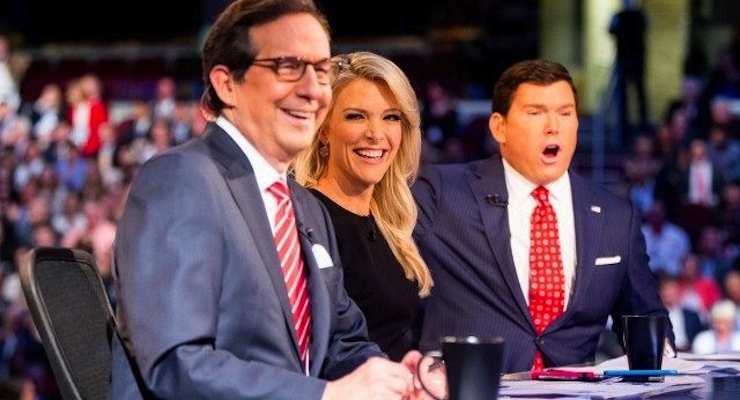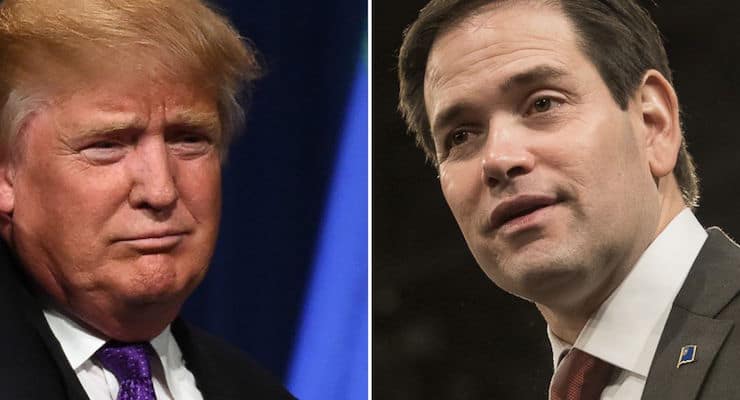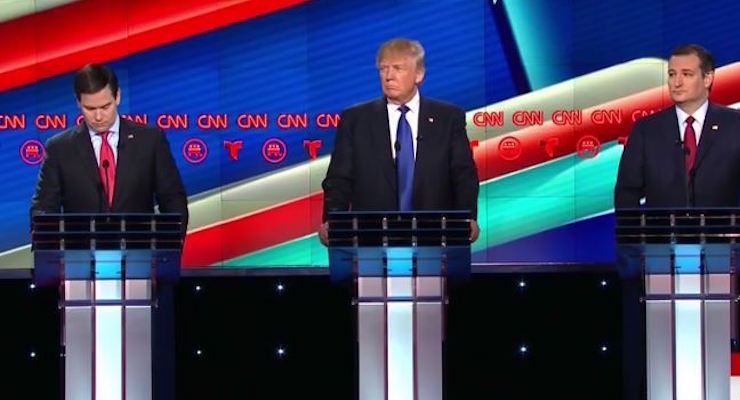Data Show Marco Rubio the Weaker Anti-Trump in Race, Ted Cruz Strongest
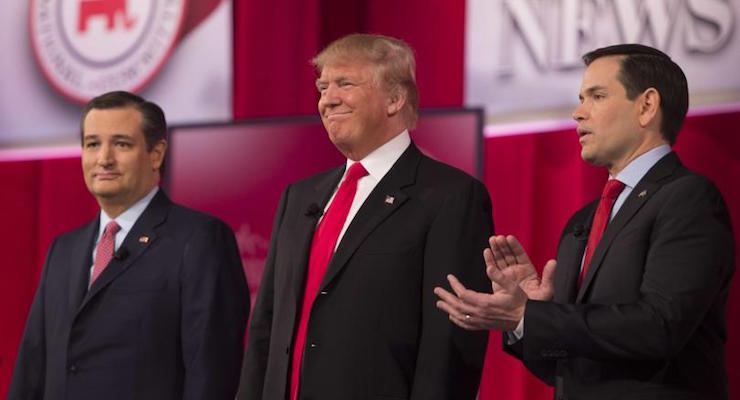
Republican presidential candidates Ted Cruz (L) and Marco Rubio (R) applaud as fellow candidate Donald Trump is introduced during the CBS News Republican Presidential Debate in Greenville, South Carolina, Feb. 13, 2016. (Photo: Jim Watson/Getty Images)
Let’s just get this out of the way first. Donald J. Trump is now highly favored to win the nomination and that’s true even if the field winnows. The Donald’s appeal is attitudinal, not ideological, which allows him to compete in majority rural, suburban and urban congressional districts, as opposed to the historical conservative vs. moderate dynamic that has traditionally been decided in the suburbs.
Because proportional delegates are awarded to candidates in a Republican primary based on the results of voting totals and thresholds in congressional districts, Trump is well-positioned to win the nomination. In fact, as I explained last week to Mr. John Fund at National Review, he can count on little more than his base to do so.
Not let’s talk about the current status of the race.
Florida Sen. Marco Rubio pulled ahead of Texas Sen. Ted Cruz in the last two contests and polls second in several SEC states. That has strengthened the media narrative that a winnowing field can beat Mr. Trump one-one-one. However, the overall data and dynamics of the race show Sen. Cruz is a far stronger anti-Trump candidate overall than Sen. Rubio.
First, the Republican primary electorate is far more conservative than in previous cycles, now clocking in at a 2 to 1 advantage. We are seeing data that contradicts the assumption that Cruz could consolidate the anti-Trump vote easily, but voters agree with him more than Rubio. On the questions of terrorism, gun rights, authenticity, vision, qualifications, values, the economy and judicial appointments, the data show voters favor Cruz over Rubio.
But it really comes down to one single obstacle that Mr. Rubio cannot and will not overcome.
The race for the Republican nomination is a state-by-state contest, one in which a candidate must carry his or her own home state in order to be seen as viable. Losing your own home state can destroy your career, period. We have surveyed the Sunshine State more than anyone for our PPD Election Projection Model and the results are consistent and clear: Sen. Rubio will lose his home state to Mr. Trump.
This was true before the frontrunner went on a three-state winning streak. It was true before and after the debate in South Carolina, the one that was allegedly going to destroy his candidacy. And absent Sen. Rubio going on to actually win several states, it will be true on March 15, when the 99 winner-take-all delegates will be awarded based on the vote.
Mr. Trump leads Sen. Rubio on the PPD average of aggregate Florida Republican Primary polls by roughly 20-points, 19.5%.
The long-held Establishment wisdom and media narrative–which claims when the field winnows a candidate can beat Mr. Trump, who has a low ceiling–is false in Florida, and has been for a while. The Donald defeats Sen. Rubio one-on-one in his own home state by an average 14 points. The reason he is doing so bad is that his state knows him best, pure and simple.
The various Florida tea party groups, who propelled him as an outsider candidate to Republican nominee and eventual winner, have completely abandoned him–for a reason. Veterans, who are frequently cited by Sen. Rubio as the constituency he serves the most, have completely abandoned him–for a reason.
Sen. Cruz has a decent chance to carry his home state of Texas and avoid an embarrassing defeat. Because the state’s delegates are allocated proportionally a win won’t change the fundamental dynamics of the race, but it will allow him to move forward.
That being said, Ohio Gov. John Kasich can make a better home state strategy case then Sen. Rubio, but his appeal has been more limited. With Sen. Rubio out of the race, however, it could change as moderate voters shuffle around. Still, it is likely too late for Gov. Kasich to do anything but force a brokered convention.
Worth noting, for those that don’t know, Sen. Rubio’s strategy now doesn’t even consist of winning many states or taking first place in Florida. The Rubio campaign has a plan to tear apart the primary electorate and party to force a brokered convention, where the party elites can ignore the will of the voters after the first ballot. If they are successful, the Republican Party almost assuredly will be defeated in November.
Finally, let me just end with this caveat. Barring Sen. Rubio drops out right now, as in before Super Tuesday, I don’t even believe Sen. Cruz still has a viable path to the nomination. The truth, whether either campaign admits it or not, is that Mr. Trump has already plowed through their firewall states. South Carolina was a must-win for Sen. Cruz and Nevada was cited over-and-over as Sen. Rubio’s adopted home state and line in the sand.
They both fell.
What I am saying is this: Sen. Rubio has been making the case that the governor and the Texas senator should get out of the race and allow him to take on Mr. Trump. And do what? Lose your own state?
While Sen. Marco Rubio has pulled ahead
